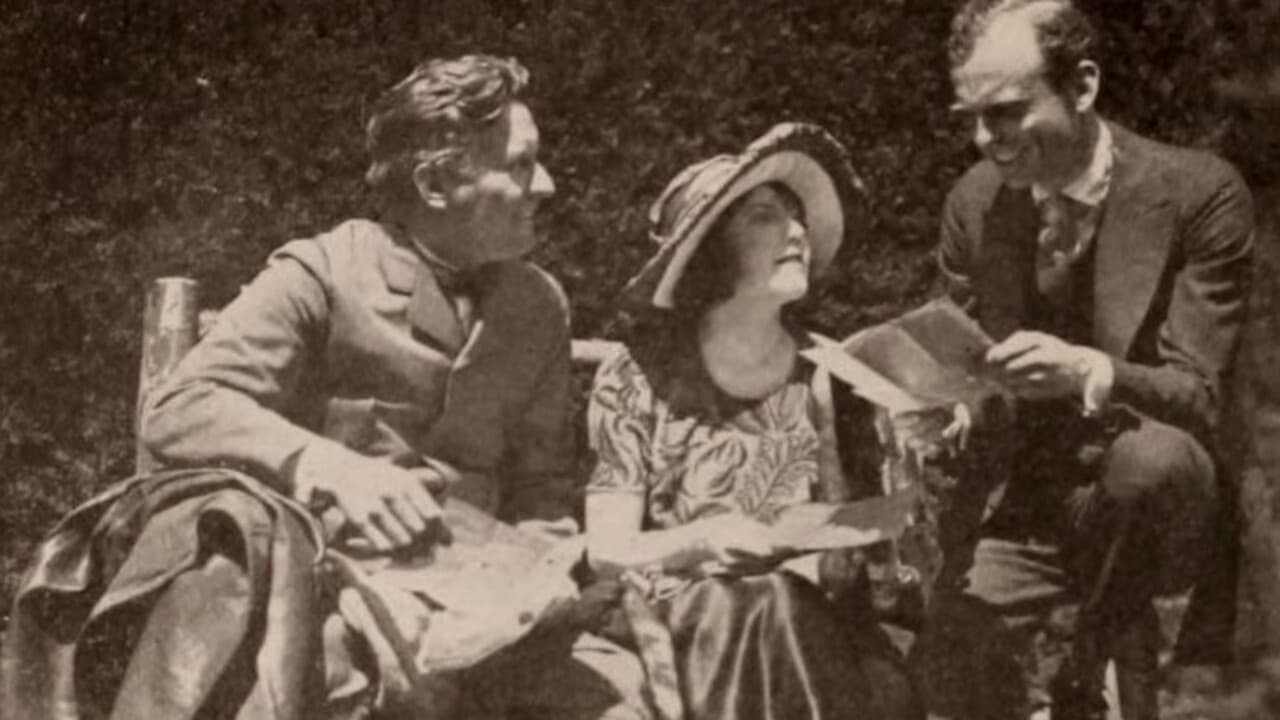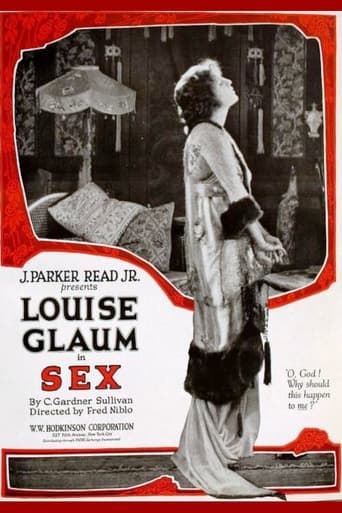Libramedi
Intense, gripping, stylish and poignant
Helllins
It is both painfully honest and laugh-out-loud funny at the same time.
Yash Wade
Close shines in drama with strong language, adult themes.
Brennan Camacho
Mostly, the movie is committed to the value of a good time.
kekseksa
I think anyone with an interest in cinema history and also with genuine appreciation of early films (not inclined that is to think in terms, now thankfully outmoded, of waxwork actors and "silent relics") will be impressed with how good this film is and will be surprised it is so little known.It follows in some ways in the lineage of the classic Theda Bara vamp film of 1914, A Fool There Was, but that film, by contrast, is rather over-rated on account of its historical importance and is a much less believable account of a vamp (Yevgeny Bauer's 1914 Ditya bolshogo goroda/Child of a Big City is a rather better film on the same subject). But both these films portray the "vamp" as a horror (A Fool There Was following Kipling's somewhat mysogynist poem), even if the Bauer, unlike the Bara film, does place the behaviour of the woman in a believable social context.Glaum's vamp in this film is a much more sympathetic character. She is for a start as much victim as predator, an aspect that had come to the fore in later in more nuanced versions of the vamp (Pastrone's Tigre Real 1916 for instance is already a case in point). In fact Glaum is less like a vamp here and more like the quasi-feminist heroines of some films of the early thirties (the 1933 Baby Face is probably the best) before the more formal enforcement of the Hays Code made it rather more difficult to portray "immoral" women as simply individuals battling to survive in an unequal world (from a point of view both of class and gender).The film is framed as an "exploitation" film (and the producer Paker Read was already something of a specialist) but this is already a device necessary, particularly in US films, to avoid censorship. Which it did very successfully in this case. The film met with a bit of flack but received rave notices with the papers carefully utilising the supposed "moral" aspect of the film to justify it while at the same time praising the honesty of Read's approach. One can find a very interesting sample of these reviews in the appropriate Wikipedia entry.Finally praise for the mise en scène which is unusually good for a US film of this period (reminiscent of the more "realist" Italian films of the period). There is a fine scene for instance where Daisy, the vamp's naive protégée, is in the foreground watching events unfold amongst the triangle of main characters deep in the background, two rooms beyond. The copy that I saw is rather poor and this is a film that could certainly do with sympathetic restoration in which case I do not doubt it would be regarded as rather more of a classic than a relic.As for the ending of the film, it is rather truer to life than those of the thirties films where reform after marriage is its own romantic reward. Here the more melodramatic possibilities are sensibly avoided, the vicious circle is well portrayed and there are worse punishments than being a lonely but wealthy woman cruising around the world.Fred Niblo is an undeservedly forgotten direct, responsible five years later for quite the best film version of the Lew Wallace novel Ben-Hur.
kidboots
Louise Glaum was one of the few actresses who posed a threat (however small) to vamp Theda Bara but she had more strings to her bow than that. She popped up a few times in William S. Hart westerns, usually playing the town bad girl with names like Poppy or "the Firefly" etc, before that she had played "the girl" in the bulk of the "Universal Ike" shorts released by Universal. A 1912 edition of Photoplay predicted a brilliant future for her and prior to her association with J. Parker Read she produced her own films for Paralta. Paralta Plays sprang up in March 1917 and wound down in May 1918 and, aside from Louise Glaum, it's big stars were Henry B. Walthall and Bessie Barriscale as well as two up and coming youngsters - Leatrice Joy and John Gilbert. Even though critics were favourably disposed to Paralta Films, by the end of 1918 the company had vanished, being taken over by Paramount.Always wanted to see Louise in that spidery creation and finally got the chance when as Adrienne Renault, star attraction at the Frivolity Club - "New York's gayest Midnight Frolic", she makes her sensational entrance from a glittering web doing the Spider Dance - "the sensation of the season". Away from the footlights she is hard boiled and takes Daisy Henderson (Peggy Pearce) under her wing - a young innocent who still blushes at the "mash notes" she receives from married men. Daisy is invited to a wild party (girls dancing on table tops etc) at Adrienne's and next day overhears a heated argument between Adrienne, Phillip (her current flame) and Phillip's wife who has come to confront the pair over their secret affair. There is a divorce and while Adrienne thinks it's a hoot, Phil's heart isn't in the mad whirl anymore and it isn't long before she falls for millionaire businessman Dick Wallace (future director Irving Cummings) who desperately wants to marry her.It may have had a salacious title but "Sex" is just the age old story with a slight twist. Marriage turns Adrienne into a love struck stay at home wife but Dick is still living like a carefree bachelor and, what's more, is having a fling with Daisy. Once sweet and innocent, Daisy is now a gold star gold digger having had lessons from Adrienne, the Master, who once told Daisy that the wife was the last person to consider when you were out for fun!!! The ending shows Adrienne, on a sea cruise trying to forget and then being confronted with the sight of Phillip and his wife away on their second honeymoon!!Peggy Pearce might not even be a memory now but back in the 19 teens she was often featured in movie magazine articles such as a 1917 Motion Picture Magazine one about freakish pets. Peggy would have the public believe that she couldn't bear to be separated from her pet billy goat and Louise Glaum was in the same article, drooling over her pet monkey Pete.
wes-connors
Louise Glaum (as Adrienne Renault) is a nightclub "Vamp" who enjoys carefree sex with the married men who come to see her dance at New York's gayest midnight frolic club - "The Frivolity". As the film opens, Ms. Glaum is having a satisfying affair with William Conklin (as Philip Overman); he is stepping out on lonely wife Myrtle Stedman (as Mrs. Overman) to see Glaum perform her sensational "Spider Dance". Glaum has taken new "Frivolity" club beauty Peggy Pearce (as Daisy Henderson) under her wing - taking her to parties and sharing her "you only live once" philosophy. Glaum wants Ms. Pearce to avoid "fly-by-nights", and hook up with a wealthy married man. Well - wouldn't you know it, but, very soon, the frivolous Glaum gets that "nest-building" urge! She finds Irving Cummings (as Dick Wallace), and settles down. Men being men, Glaum soon finds herself sitting home alone, while Mr. Cummings steps out to "The Frivolity" and finds a mistress - who can she be? The luridly titled "Sex" is really an old-fashioned morality story; specifically, it preaches, "The standards of morality eternally demand that the naked soul of Sex be stripped of its falsehoods - which can only be atoned for through bitter tears." Satan even makes a cameo appearance; laughing at Glaum as she parties with Cummings, the devil knows what is in store for the couple! Note, however, that the film offers hope for redemption, as evidenced in its extended coverage of Mr. and Mrs. Overman's storyline.Glaum is great as the "Partying Mistress" turned "Dutiful Wife" - she is very convincing, in a wide ranging role. Watch for the scene where Glaum discovers the identity of her husband's mistress; it's an expertly performed silent scene. The supporting cast is also effective - Pearce (aka Viola Barry) and Cummings (later, a successful director) playing well opposite Glaum. And, Fred Niblo directed "Sex" with a sure touch. Despite its strengths, however, the styles and situations on-screen make the film seem more like a silent relic than a silent classic. ****** Sex (3/29/20) Fred Niblo ~ Louise Glaum, Irving Cummings, Viola Barry
TimesSquareAngel
This film was released on VHS by Grapevine Video Inc. in the 1990's but seems to be no longer in stock. The print is a little fuzzy but does not suffer from nitrate decomposition.Despite the enticingly frank title this is actually a morality tale of a woman who is done to as she has done unto others. The costumes and sets are deliriously bizarre and outré and the direction solid. Miss Glaum, a Theda Bara competitor, is a solid and attractive actress who seems a touch wholesome compared to more recent screen hussies. Whereas Theda Bara seems to have played women who were beyond redemption, Glaum does succumb to the lure of marital contentment only to discover that her former protegé has snagged her rich, indolent playboy husband. Ms. Glaum in her full vamp mode wears a lot of loose, off the shoulder gowns, smokes up a storm and knocks down alcoholic beverages with gusto. Except for some smooching and a few legs on the lap, not much of the titular activity is seen on the screen though heavily implied.

